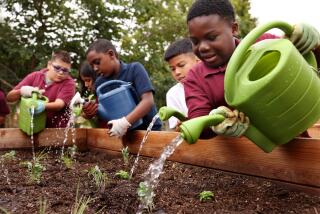State Park’s Day Camp Turns Out Young Environmentalists
- Share via
If anyone wanted to pave over any part of the rocky shore at Leo Carrillo State Beach, they would have to first get through 9-year-old Laura Claire Lombardi.
And 7-year-old Ryder Brown.
And 12-year-old Vaughn Calandra.
Don’t underestimate them because of their ages, either.
Thanks to the state park’s EcoKids day camp, they and dozens of other youngsters ages 7 to 12 are armed with all the information they need to argue against any development proposed for the pristine state beach at Ventura County’s border with Los Angeles County.
They can tell you about the fragile marine life in the tide pools that would be vulnerable to contamination from runoff. Or the importance of undeveloped land in the canyons for wildlife you can’t see anywhere else. Or how the creek and the native coastal sage scrub habitats could become polluted.
Camp organizers hope the lessons learned by the 15 or so youngsters who take part in the one- to five-week summer program will come in handy later in life, when they may sit on some governing board and be confronted with such a land-use controversy.
And, not surprisingly, these children appear to be firmly on nature’s side. Vaughn, of Newbury Park, said he would vote against any construction near the coastal zone.
“I wouldn’t like that--it’s not a nice idea,” the boy said. “This place saves a lot of wildlife that would be taken over by roads.”
“If anyone tried it I would say that wouldn’t be necessary because this is a state park,” said Christian Chenault, 9, who lives in Malibu.
The Leo Carrillo program, in its second year, is one of only a few day camps in Southern California tightly focused on conservation. Although there are scores of day camps and junior lifeguard or junior ranger programs, they don’t emphasize teaching children how to think green, said state park interpreter Cara O’Brien, who developed and coordinates EcoKids.
“It’s really important for them to realize that parks are there and vital to their survival, and they can see how everything is connected,” she said. “It’s great because with a long-term program, you can really make an impact. By the end of the week, it’s their park. They feel invested.”
Parents agree, which is why the program has continued to grow. This is the first year that scholarships are being offered for those who can’t afford the $100-per-week fee.
“It’s good because they don’t just put them in the water like other programs do,” said Ventura County resident Rena Patterson, whose 12-year-old son, Hunter, is in the program. “He’s told us all about the wild animals they saw, and yesterday they built a solar oven--it was cool.”
“She’s learning how to save the ocean and save the forests--and that I like,” said Malibu resident Hiroshi Saito of his 12-year-old daughter, Wren.
In EcoKids, activities are pegged to daily themes, O’Brien said. On Monday, leaders cover the sage scrub habitat and the watershed; Tuesdays, intertidal habitats; Wednesdays, the children learn about the open ocean; Thursdays deal with linking humans to natural resources; and on Fridays there is a wrap-up lecture and usually a guest speaker--from archeologists to members of Santa Monica’s Heal the Bay environmental group.
On Wednesday, the attentive group learned about the kelp forest that flourishes off Leo Carrillo’s coast and about grunion--the silvery fish famous for midnight “runs” from the ocean to the sand, where they lay their eggs.
Pepperdine University biologist Karen Martin talked about how larvae grow into adult organisms and helped the campers hatch grunion eggs in paper cups filled with sand and water.
Aimee Hamel, 8, of Malibu, marveled at her minuscule grunion larva.
“We tried to see them once before, but we didn’t find any,” she said, satisfied with the tiny swimming creature she witnessed come into the world.
More to Read
Sign up for The Wild
We’ll help you find the best places to hike, bike and run, as well as the perfect silent spots for meditation and yoga.
You may occasionally receive promotional content from the Los Angeles Times.






